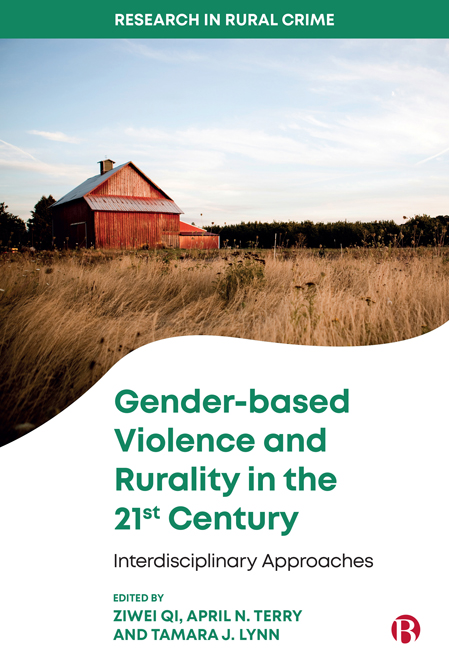Book contents
- Frontmatter
- Contents
- Series Preface
- List of Figures and Table
- List of Abbreviations
- Glossary
- Notes on Contributors
- Foreword
- 1 Understanding Rurality and Gender-based Violence
- PART I Rurality and Gender-based Violence
- PART II Beyond the Rural/Urban Divide: Critical Issues in Gender-based Violence
- PART III Access to Rural Justice: Economic Consequences and Policy Implications
- Index
6 - ‘Trying to Avoid Coyotes’: The Nexus of Rurality, Violence and Inequality
Published online by Cambridge University Press: 20 January 2024
- Frontmatter
- Contents
- Series Preface
- List of Figures and Table
- List of Abbreviations
- Glossary
- Notes on Contributors
- Foreword
- 1 Understanding Rurality and Gender-based Violence
- PART I Rurality and Gender-based Violence
- PART II Beyond the Rural/Urban Divide: Critical Issues in Gender-based Violence
- PART III Access to Rural Justice: Economic Consequences and Policy Implications
- Index
Summary
Introduction
Despite the popularised idyll of rural life, domestic violence transcends community contexts and geographies. The Department of Justice's Office on Violence Against Women defines domestic violence as:
[V] iolence committed by a current or former spouse or intimate partner of the victim, by a person with whom the victim shares a child in common, by a person who is cohabitating with or has cohabitation with the victim as a spouse or intimate partner, by a person similarly situated to a spouse of the victim under the domestic or family violence laws of the jurisdiction. (U.S. Department of Justice – Office on Violence Against Women, 2021)
Estimates suggest 25 per cent of all women will endure domestic and/or intimate partner violence at some point in their lives, with approximately three women killed by their husbands or boyfriends each day in the United States (CDC, 2020; Futures Without Violence, 2021). Domestic violence impacts people of all races, cultures, gender identities, sexual orientations and relationship types. Yet, scholarship routinely focuses on metropolitan women's experiences of domestic violence even though rural women and women of marginalised identities are disproportionately impacted.
This chapter expounds the intersection of rurality, domestic violence and social inequality. Specifically, this chapter delineates what is known about domestic violence in rural locales and the ways it disproportionately impacts those most vulnerable. To humanise rural domestic violence scholarship, the chapter leverages my own community-based, action-oriented ethnographic research to highlight several survivors’ lived experiences of domestic violence in their rural western United States community. Importantly, survivors’ lived experiences raise awareness about the unique, intersectional dimensions of rural domestic violence. From this, the chapter offers suggestions for ways to better address rural domestic and gendered violence, offering a path forward for future scholarship and social action.
The interface of rurality and domestic violence
Rurality is a critical dimension of the social world. Rural community contexts have been under study for decades, with rural poverty and economics, housing and food insecurity, transportation, racial justice and Indigenous rights being some of the most central areas of study. Rural crime, criminal justice and social justice are also blossoming areas of international scholarship, with domestic violence no exception (Rennison et al, 2013; Carrington et al, 2014).
- Type
- Chapter
- Information
- Gender-based Violence and Rurality in the Twenty-first CenturyInterdisciplinary Approaches, pp. 77 - 92Publisher: Bristol University PressPrint publication year: 2023



